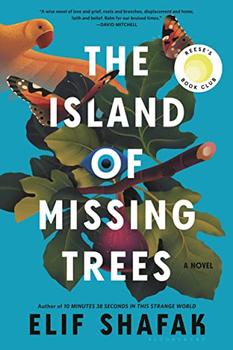Summary | Excerpt | Reading Guide | Reviews | Beyond the book | Read-Alikes | Genres & Themes | Author Bio

A Novel
by Elif ShafakThe Island of Missing Trees by Elif Shafak tells a tale of generational trauma, explores identity and pays homage to the natural world in prose so lyrical it melts into your very spirit. Oscillating between past and present, the narrative is split between the ruminations of a fig tree; the love story of a Greek Cypriot, Kostas, and Turkish Cypriot, Defne, in 1974 Cyprus; and the mourning of the lovers' 16-year-old daughter, Ada Kazantakis, in London in the 2010s after the death of her mother. The story is not told linearly, rather, much like reality, the pieces arrive in distinct moments that eventually coalesce into the truth. The torrid romance of Kostas and Defne reveals the trauma wrought by ethnic strife and colonialism across generations, on humans and on ecosystems throughout the world. Their story humbles the reader, shedding light on our dependency on the planet we inhabit and the consequences of tribal warfare.
Kostas and Defne are both Cypriots, and yet they are different from one another, in that one is Turkish and the other Greek. Aware of the violent opposition that would arise should their families and fellow islanders learn of their forbidden affair, they carry out their meetings clandestinely with the help of the owners of a local tavern, The Happy Fig. Here, their youthful passions blossom under the shadow of mounting tensions and an observant fig tree, which grows through the center of the bar. During their budding romance, the catastrophic events of the 1974 Cypriot Civil War are imminent. All the while, the fig tree bears witness to the lovers and the events unfolding around them. Escaping the plight of their little island, Kostas and Defne migrate to London, leaving familial discord in their wake. They choose to shelter their daughter, Ada, from the violence of their pasts. This surreptitiousness complicates Ada's grief, and the death of her mother ultimately uproots the past that has shaped her familial circumstances.
The choice to give voice to a fig tree provides a mystical element that is reminiscent of a fable, but Shafak's effortless prose truly makes this character seem human. Through the tree's musings, we are inundated with the reality of the natural world. She tells us about the essential roles fruit bats play in the environment, and the complex journey of bees and the flora they coexist with. It seems like it would be out of place to cite technical and scientific information within a novel, but these facts daze the reader into thoughtful introspection on the smallness of our beings. Despite history being replete with men believing all other creatures submit to them, it is we who are subservient to nature. The fig tree reminds us that, "Humans walk by us every day, they sit, and sleep, smoke and picnic in our shade, they pluck our leaves and gorge themselves on our fruit…and yet they still do not see us." But despite the destruction humans have brought upon her world, the gorgeous tree is filled with empathy for us, and concern for the sorrow of Kostas. Her voice feels phantasmic behind the story of the Kazantaki family. She has witnessed the most intimate of human moments and the most bestial of human actions. The reader will be haunted by the sense that the natural world stands judicially sentient among us.
Shafak forces the reader to confront the violence and trauma that Ada's parents hoped to protect her from. But without such honest reckoning, justice for the land and its inhabitants is a meek and distant dream. We cannot neglect the very earth that protects the dead that we mourn. Through the eyes of this arboreal being, the ramifications of rapacious leaders, colonialism and divisive partitions are unobscured. We come to understand that all forms of life are inextricably intertwined and when one link is poisoned, the rest will dwindle slowly and painfully. When a tree and migrant are uprooted from their homes, this trauma becomes indelible upon their offspring. In spite of Ada's parents' best efforts to raise her without the cloud of their past, it follows her insidiously. Only when the truth is revealed does she find a melancholic respite. The Island of Missing Trees is far more than a prosaic love story. It is a tribute to ecosystems everywhere and their resilience in the face of utter devastation.
![]() This review was originally published in The BookBrowse Review in November 2021, and has been updated for the
March 2023 edition.
Click here to go to this issue.
This review was originally published in The BookBrowse Review in November 2021, and has been updated for the
March 2023 edition.
Click here to go to this issue.

If you liked The Island of Missing Trees, try these:

by Carys Davies
Published 2025
A stunning, exquisite novel from an award-winning writer about a minister dispatched to a remote island off of Scotland to "clear" the last remaining inhabitant, who has no intention of leaving—an unforgettable tale of resilience, change, and hope.

The Djinn Waits a Hundred Years
by Shubnum Khan
Published 2025
"A dark and heady dream of a book" (Alix E. Harrow) about a ruined mansion by the sea, the djinn that haunts it, and a curious girl who unearths the tragedy that happened there a hundred years previous
To be ignorant of what occurred before you were born is to remain always a child
Click Here to find out who said this, as well as discovering other famous literary quotes!
Your guide toexceptional books
BookBrowse seeks out and recommends the best in contemporary fiction and nonfiction—books that not only engage and entertain but also deepen our understanding of ourselves and the world around us.